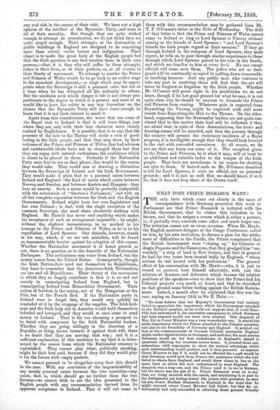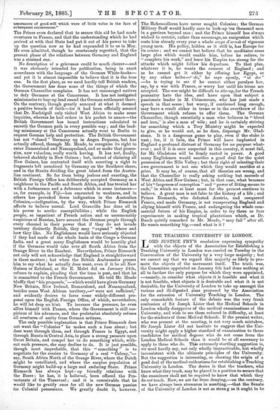WHAT DOES PRINCE BISMARCK WANT WHAT DOES PRINCE BISMARCK WANT
THE only facts which come out clearly in the mass of correspondence with Germany presented this week to Parliament are that Prince Bismarck is irritated with the British Government, that he wishes this irritation to be known, and that he assigns a reason which is either-a pretext, or, if partially true, conceals some other and much larger one. The irritation comes out on every occasion. When Mr. Meade, the English assistant-delegate at the Congo Conference, called on him, by his own invitation, to discuss a plan for the settlement of difficulties in the Pacific, the Prince complained that the British Government were "closing up" his Colonies at Angra Pequena and the Cameroons, that they grudged him " unworthily " a strip of land in New Guinea, and that in general he had for two years been treated badly by England, "whose actions do not accord with her professions." The general effect of his conversation with Mr. Meade—who, it is just to record en passant, bore himself admirably, with just the mixture of firmness and deference which became the relative positions of the speakers—was to show that the Prince had his Colonial projects very much at heart, and that he cherished on that ground some bitter feeling against the British Government. Indeed, a month after he explained that this was the case, saying on January 24th to Sir E. Malet
"He must believe that her Majesty's Government had entirely failed to appreciate the importance which his Government attached to the Colonial question, as he could not suppose that, if Lord Granville had understood it, the successive annoyances to which Germany had been exposed would not have been averted. This despatch of May 5th to Count Munster was a very remarkable one. It stated the great importance which the Prince attached to the Colonial question, and also to the friendship of Germany and England. It pointed out that at the commencement of German Colonial enterprise England might render signal service to Germany, and said that for such service Germany would use her beat endeavours in England's behalf in questions affecting her interests nearer home. It pressed these considerations with arguments to show the mutual advantage which such understanding would produce, and it then proceeds to instruct Count Munster to say if it could not be effected the reault would be • that Germany would seek from France the assistance which she had failed to obtain from England, and would draw closer to her on the same lines on which she now endeavoured to meet England. The despatch was a long one, and the Prince read it to me in German, but the above was the gist of it. Prince Bismarck went on to say that, not being satisfied with the result, and attributing it in part to the Ambassador not having stated the points with precision, he sent his son, Count Herbert Bismarck, to England, in the hope that he might succeed where Count Minster had failed ; but that he, an. fortunately had. only succeeded in obtaining those general friendly
assurances of good-will which were of little value in the face of subsequent occurrences."
The Prince even declared that to secure this aid he had made overtures to France, and that the understanding which he had arrived at with that State had put it out of his power to take 'up the question now as he had expounded it to us in May. He even admitted, though he courteously regretted, that the present phase of the relations between Germany and England was a strained one.
No description of a grievance could be much clearer—and it was obviously intended for publication, being in exact accordance with the language . of the German White-booksand yet it is almost impossible to believe that it is the true one. In the first place as we need hardly tell British readers, the Government has done none of the things of which the German Chancellor complains. It has not encouraged natives to defy Germans at the Cameroons. It has not instigated missionaries to buy-up land round the German settlement there. On the contrary, though greatly annoyed at what it deemed a positive breach of faith—for it had been officially assured that Dr. Nachtigall only visited West Africa to make some inquiries, whereas he had orders in his pocket to annex—the British Government has issued instructions calculated to smooth the German path in every possible way ; and the leading missionary at the Cameroons actually went to Berlin to request German help and protection. The British Government has not "closed" Germany up in Angra Pequena, but has actually offered, through Mr. Meade, to recognise its right to enter Damaraland and Namaqualand, and so make that possession, now valueless, really worth having. It has not, finally, behaved shabbily in New Guinea ; but, instead of claiming all New Guinea, has contented itself with asserting a right to fragments left unnoticed by Germany on the Southern shore, and in the Straits dividing the great island-from the Australian continent. So far from being jealous and exacting, the British Foreign Office has deliberately accepted Germany as a neighbour in the Pacific and South Africa, and has treated her with a forbearance and a deference which in some instances— as, for example, in Fiji—has amounted to weakness, and in others has provoked fierce indignation in the Australian Colonies,—indignation, by the way, which Prince Bismarck affects to believe unreal. Lord Granville has done all in his power to soothe susceptibilities ; while the English people, so impatient of French action and so unreasonably suspicious of Russian, have assured the German people through every channel in their power that if they do not invade territory distinctly British, they may " expand " where and how they like. No Englishman would have seriously objected if they had made of the whole basin of the Congo a German India, and a great many Englishmen would be heartily glad if the Germans would take over all South Africa from the Orange River to the Zambesi. Nevertheless, Prince Bismarck not only will not acknowledge that England is straightforward in these matters ; but when the British Ambassador presses him to say what he actually does want, even if it be all New Guinea or Zululand, as Sir E. Malet did on January 24th, refuses to explain, pleading that the time is past, and that he is committed to the French Government. He told Mr. Meade bluffly that "his proposals,"—which would have given Germany New Britain, New Ireland, Damaraland, and Namaqualand, besides some West African territory,—" were not sufficient," and evidently desires to force some widely-different proposal upon the English Foreign Office, of which, nevertheless, he will let drop no hint. To increase the pressure, he even allies himself with France, where the Government is still suspicious of his advances, and the proletariat absolutely refuses all overtures of amity from German artisans.
The only possible explanation is that Prince Bismarck does not want the " Colonies " he makes such a fuss about ; but does want through them, and through France in Egypt, and through Russia in Central Asia, to place a strong pressure upon Great Britain, and compel her to do something which, without such pressure, she may decline to do. It is just possible, though most improbable, that this " something ' is to negotiate for the cession to Germany of a real " Colony,"— say, South Africa Mirth of the Orange River, where the Dutch might be conciliated, and where the surplus population of Germany might build-up a large and enduring State. Prince Bismarck has always kept up friendly relations with the Boers ; he has, it is believed, been offered the Protectorate of the Transvaal ; and it is conceivable that he would like to gratify once for all the new German passion for Colonial possessions. We greatly doubt it, however. The Hohenzollerna have never sought Colonies ; the German Military Staff would hardly care to lock-up ten thousand men in a garrison beyond seas ; and the Prince himself has always wished to restrict, rather than encourage, an emigration which costs him already every year a whole corps d'arnuir of vigorous young men. His policy, hidden as it still is, has Europe for its centre ; and we cannot but believe that he meditates some large plan which would enable him, before he retires, to "complete his work," and leave his Empire too strong for the attacks which might follow his departure. To that plan, whatever it is, he wants the consent of England ; and as he cannot get it either by offering her Egypt, or by any other bribe—" do," he says openly, " ut des" —he is trying to see if he cannot either paralyse her, say, by a war with France, or worry her until his terms are accepted. The war might be difficult to stir-up, for the French peasantry hate the idea, and have upon that subject a passionate leader in M. Clemenceau, who has just made a speech in that sense ; but worry, if continued long enough, may have a result either in terms or in the overthrow of the Government which refuses to offer them. The Gernian Chancellor, though essentially a man who believes in "blood and iron," is also a man of wile ; and he is certainly striving for something which a Tory Ministry might be expected to give, or he would not, as he does, disparage Mr. Gladstone. It is a dangerous game to play, even if the stake is vast ; for, if it fails, the Prince will have implanted in England a profound distrust of Germany for no purpose whatever ; and if it is once suspected in this country, it must fail, for Mr. Gladstone will be. firmly rooted in power. A good many Englishmen would sacrifice a good deal for the quiet possession of the Nile Valley ; but their right of selecting their own government is not one which they would sacrifice at a price. It may be, of course, that all theories are wrong, and that the Chancellor is really asking nothing but morsels of West Africa and New Guinea ; but, in that case, what becomes of his "largeness of conception" and "power of fitting means to ends," in which we at least must for the present continue to believe. A great man is not false to the history of a life ; and Prince Bismarck, who defeated Austria, and conquered France, and made Germany, is not exasperating &gland and allying himself with France, and endangering the whole commercial future of his Empire, in order to try three or four experiments in making tropical plantations which, as Dr. Busch quietly remarked to Mr. Meade, "may fail " after all. He wants something big,—and what is it ?



































 Previous page
Previous page